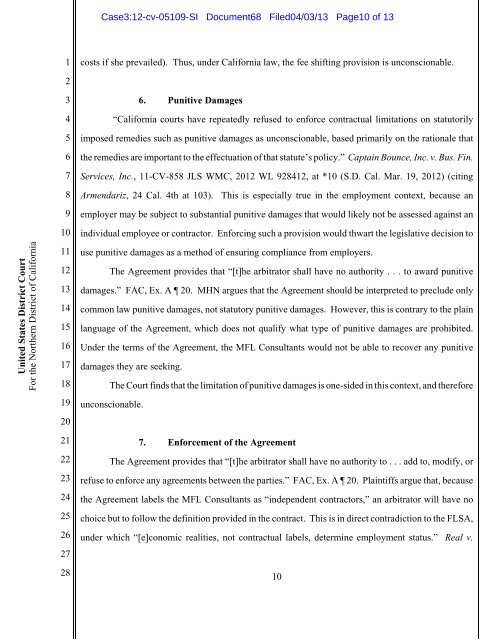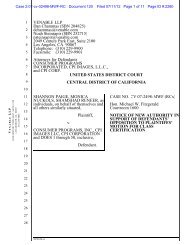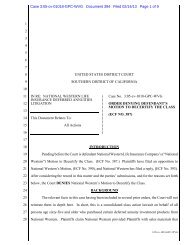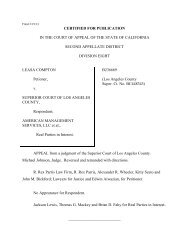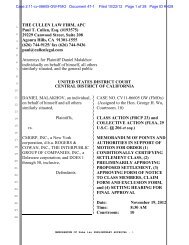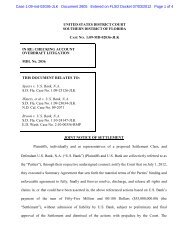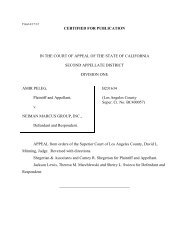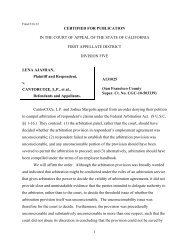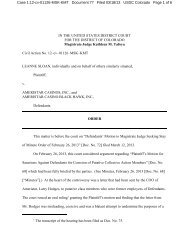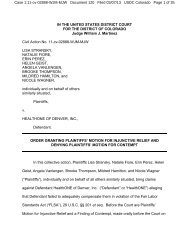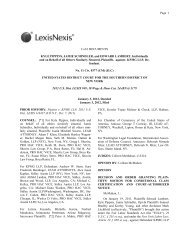order denying motion to compel arbitration - Impact Litigation Journal
order denying motion to compel arbitration - Impact Litigation Journal
order denying motion to compel arbitration - Impact Litigation Journal
You also want an ePaper? Increase the reach of your titles
YUMPU automatically turns print PDFs into web optimized ePapers that Google loves.
Case3:12-cv-05109-SI Document68 Filed04/03/13 Page10 of 13<br />
1<br />
costs if she prevailed). Thus, under California law, the fee shifting provision is unconscionable.<br />
2<br />
3<br />
4<br />
5<br />
6. Punitive Damages<br />
“California courts have repeatedly refused <strong>to</strong> enforce contractual limitations on statu<strong>to</strong>rily<br />
imposed remedies such as punitive damages as unconscionable, based primarily on the rationale that<br />
United States District Court<br />
For the Northern District of California<br />
6<br />
7<br />
8<br />
9<br />
10<br />
11<br />
12<br />
13<br />
14<br />
15<br />
16<br />
17<br />
18<br />
19<br />
20<br />
the remedies are important <strong>to</strong> the effectuation of that statute’s policy.” Captain Bounce, Inc. v. Bus. Fin.<br />
Services, Inc., 11-CV-858 JLS WMC, 2012 WL 928412, at *10 (S.D. Cal. Mar. 19, 2012) (citing<br />
Armendariz, 24 Cal. 4th at 103). This is especially true in the employment context, because an<br />
employer may be subject <strong>to</strong> substantial punitive damages that would likely not be assessed against an<br />
individual employee or contrac<strong>to</strong>r. Enforcing such a provision would thwart the legislative decision <strong>to</strong><br />
use punitive damages as a method of ensuring compliance from employers.<br />
The Agreement provides that “[t]he arbitra<strong>to</strong>r shall have no authority . . . <strong>to</strong> award punitive<br />
damages.” FAC, Ex. A 20. MHN argues that the Agreement should be interpreted <strong>to</strong> preclude only<br />
common law punitive damages, not statu<strong>to</strong>ry punitive damages. However, this is contrary <strong>to</strong> the plain<br />
language of the Agreement, which does not qualify what type of punitive damages are prohibited.<br />
Under the terms of the Agreement, the MFL Consultants would not be able <strong>to</strong> recover any punitive<br />
damages they are seeking.<br />
The Court finds that the limitation of punitive damages is one-sided in this context, and therefore<br />
unconscionable.<br />
21<br />
22<br />
23<br />
24<br />
25<br />
26<br />
27<br />
7. Enforcement of the Agreement<br />
The Agreement provides that “[t]he arbitra<strong>to</strong>r shall have no authority <strong>to</strong> . . . add <strong>to</strong>, modify, or<br />
refuse <strong>to</strong> enforce any agreements between the parties.” FAC, Ex. A 20. Plaintiffs argue that, because<br />
the Agreement labels the MFL Consultants as “independent contrac<strong>to</strong>rs,” an arbitra<strong>to</strong>r will have no<br />
choice but <strong>to</strong> follow the definition provided in the contract. This is in direct contradiction <strong>to</strong> the FLSA,<br />
under which “[e]conomic realities, not contractual labels, determine employment status.” Real v.<br />
28 10


